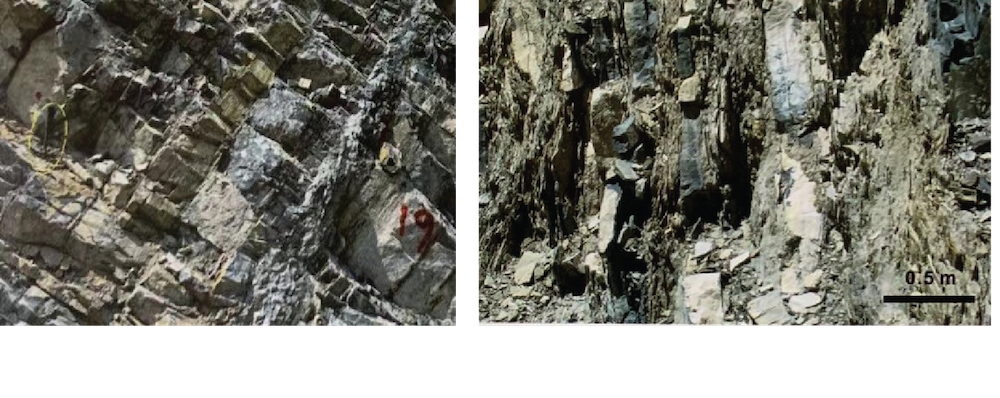Shanjiang Fm
Type Locality and Naming
The type section is situated 0.7 km north of the village Alengcuo, about 15 km east of Mingyin Town, Lijiang Zangzu Zizhixian (GPS: 100o30’34.1’’-27o17’6.6’’ N), Yunnan Province. It was named by Duan Yanxu, Li Dingrong and Lengconglin in 1974 and published by Yu Changmin and Liao Weihua in 1978.
Lithology and Thickness
Limestone. This formation is characterized by dark-gray well-bedded bioclastic limestone intercalated with a few beds grayish black calcareous shale, siltstone and argillaceous limestone. Partly, the couplets of thin-bedded limestone and shale displayed cycle sequence. Some thick-bedded limestones occurred in the lower part. It has a maximum thickness of 349 m.
Figure Outcrops of upper part (left) and lower part alternating thin bedded limestone and shale (right) of Shanjiang Formation in the stratotype (after Wang Huanhuan et al., 2018).
Relationships and Distribution
Lower contact
It rests conformably on the nodular limestone of Baizitian Fm, Upper Silurian.
Upper contact
Conformable contact with overlying Alengchu Fm , but the boundary is not well defined lithologically.
Regional extent
The regional distribution is very restrictive only reported from this area along the Jinshajiang River.
GeoJSON
Fossils
The main fossils are corals Tryplasma cf. subcruciatum, Cysticonophyllum cf. dentatum, Stortophyllum cf. suberciatum, Pseudomplexus sp., Favosites sp., Heliolites sp., Chalcidos, Eognathodus trilinearis etc.phyllum sp.,tentaculites Paranowakia bohemica, Nowakia acuaria, conodonts Caudicriodus hesperius?, Lanea planilingua, Masaraella pandora, Latericriodus steinachensis, Gondowania irregularis, Eognathodus trilinearis etc.
Age
Depositional setting
The lithology and fossils reflect different sedimentary condition. Dacryoconarids and conodonts are indicative of pelagic open-sea environment, while the large amount of benthic faunas with allochthonous limestones may represent a platform margin setting.
Additional Information
